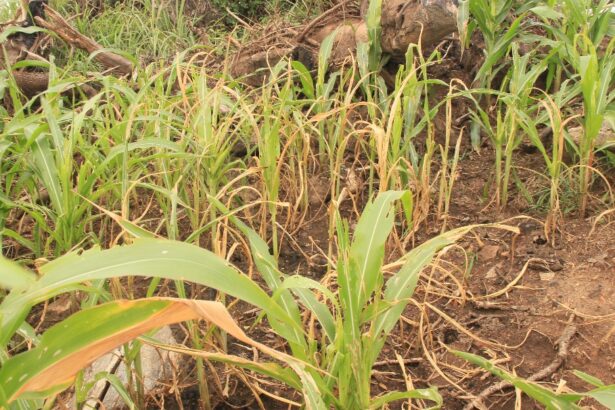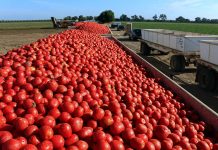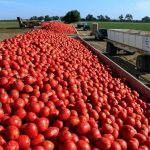Approximately 9,855 farmers in the Lambussie District of the Upper West Region have been affected by this year’s dry spell.

Among them, 5,255 are male and 4,600 are female.
The prolonged dry conditions have resulted in either partial or complete destruction of their crops, leaving them with the difficult task of assessing their losses.
According to the District Department of Agriculture, key crops such as maize, rice, groundnut, yam, millet, and sorghum have been significantly impacted. Of the 28,980 hectares cultivated in the district, 17,160 hectares have been affected, raising concerns about potential food insecurity for the upcoming harvest season.
District Director of Agriculture, Nambie Nathaniel, reported that the dry spell severely affected crop germination, with some crops exhibiting germination rates as low as 20 to 50%.
Nambie Nathaniel added that “the major challenge facing farmers in the district is the absence of well-engineered irrigation infrastructure in the district to promote irrigation farming without solely relying on rain fed agriculture to produce food”.
Daniel Banuoku, Deputy Director of the Centre for Indigenous Knowledge and Organizational Development (CIKOD), has highlighted that traditional agricultural practices in the Upper West Region are no longer sustainable due to new climate realities, necessitating urgent adaptation measures.
“The Upper West Region has been severely impacted by drought since April 2024, worsened by climate change and variability.
The region’s heavy reliance on rain-fed agriculture and its fragile ecosystem make it particularly vulnerable,” he explained.
Banuoku revealed that the drought has affected over 900,000 hectares of farmland, leading to approximately GHC 3.5 billion in losses from agricultural investments and potential revenue losses of up to GHC 10 billion.
He called for immediate action from the government, development partners, and civil society to assist affected communities and promote sustainable agricultural practices.
Besides Lambussie District, the dry spell has also impacted Sissala East, Sissala West, Nandom, Wa East, and Lawra.
























































![[FREE FREE MONEY] Predict and Win a Guaranteed GH¢200 From Us EVERY WEEK](https://wordpress.ghanatalksradio.com/wp-content/uploads/2022/02/Predict-and-Win-Final-09-03-2021-218x150.jpg)
![[Predict & Win – 8th/Oct.] WIN A Guaranteed ¢200 From Us This Week](https://wordpress.ghanatalksradio.com/wp-content/uploads/2021/10/maxresdefault-16-218x150.jpg)
![[Predict & Win – 2nd] WIN A Guaranteed ¢200 From Us This Week](https://wordpress.ghanatalksradio.com/wp-content/uploads/2021/09/maxresdefault-50-218x150.jpg)
![[Predict & Win – 25th] WIN A Guaranteed ¢200 From Us This Week](https://wordpress.ghanatalksradio.com/wp-content/uploads/2021/09/maxresdefault-36-218x150.jpg)
![[Predict & Win – 18th] WIN A Guaranteed ¢200 From Us This Week](https://wordpress.ghanatalksradio.com/wp-content/uploads/2021/09/maxresdefault-23-218x150.jpg)







![[National cathedral] See full list of churches that have contributed since 2018](https://wordpress.ghanatalksradio.com/wp-content/uploads/2020/09/Ghana-National-Cathedral-GhanaTalksRadio-100x70.jpg)



